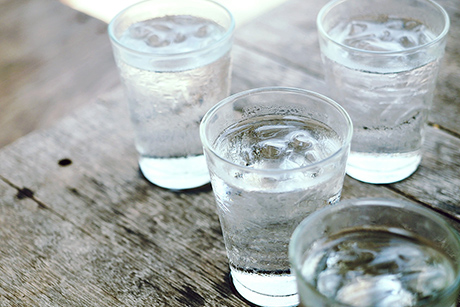
Coconut water had its moment, but now it’s time to add some new, plant-extracted thirst-quenchers to the mix: birch water and maple water. Unlike coconut, birch and maple water provide a much smaller environmental impact, with some companies making them right here in Canada. And both birch and maple water are far lower in sugar than coconut water — something the tropical drink is often scrutinized for. Before you tap into this health trend, here are some nutrition facts and faults to see if there’s a clear winner.

Health Benefits of Birch Water
Birch water, also known as birch sap, is derived from tapping birch trees to release their liquid. Over the winter, birch trees store a great deal of nutrition, which is released in their sap (or water) once mild, springtime temperatures begin to thaw the frost.
Birch trees are commonly found in Canada, Russia and Scandinavia— and the water has been used as an energy tonic centuries prior to it becoming the health food we know today. As the spring thawing commences, the birch water in Canada begins to run, so now is the time to get your fix.
Related: Sensational Canadian Cocktails
The sugar produced by birch trees, xylitol, is used as a natural, low-calorie sweetener in chewing gum and other candies. This is what is naturally sweetens birch water, satisfying your sweet tooth without being overwhelming. Because xylitol is low in calories, birch water is a much less caloric drink option than many other natural waters on the market. With only two to three grams of sugar per cup, it beats maple water in this regard. Minerals found in birch water appear in trace amounts, though it does deliver several phytochemicals (plant nutrients) and amino acids that may be beneficial to your health.
What Does Birch Water Taste Like?
With a gentle, sweet taste (when purchased “pure”), many find birch water a refreshing, crisper-tasting option to plain water.
Where to Buy Birch Water
In Canada, birch water can be purchased directly from the company producing it (online or in-person). A leader in the Canadian birch water producers is 52º North, located in British Columbia. 52º North has flavoured birch waters, but a natural option without flavouring (and added sugar) should be your go-to for the most nutritious option. Due to the delicate, seasonal nature of birch water’s extraction, it’s a pretty pricy beverage.
Related: Sweet Maple Recipes to Celebrate Syrup Season
Health Benefits of Maple Water
Like birch, maple water is the liquid that’s extracted when a maple tree is tapped. Boiling this liquid down results in something we’re all familiar with: maple syrup. Maple water is far more sustainable than other natural waters, with a minimal environmental footprint (if consumed where it’s produced — like Canada, for instance).
As maple trees store nutrition over the winter during their sleepy hibernation, the sap that results from the springtime thaw is loaded with nutrition, but in small amounts. Maple water is higher in bioactive compounds than birch water, but is slightly higher in sugar, with three to five grams per cup. And, maple water has a richer electrolyte profile, making it a lower-sugar sports recovery drink option if you’re exercising for extended amounts of time, or recovering from the flu.
According to Canadian maple water company SEVA, maple water contains 46 bioactive nutrients, including minerals, amino acids and organic acids. Maple water contains abscisic acid (ABA), a plant hormone that may help plants adapt to stress. In humans, ABA may help to balance blood sugar. As this is a fairly new, buzzed-about product, more studies need to be done before it’s established as a cure-all.
What Does Maple Water Taste Like?
Maple water has a soft, maple flavour and delicate sweetness. It’s crisp, clean and refreshing. Many find maple water far more palatable than coconut water, both in taste and texture.
Where to Buy Maple Water
Unlike birch water, maple water is becoming far more common in the everyday grocery store. Look for it in the natural food aisle, right next to the coconut water. Online retailers are also getting in on the trend, with giants like Amazon carrying this trendy new drink.
How to Drink Birch Water and Maple Water
Beyond sipping it straight from the carton, birch and maple waters can be used to make coffee, tea, smoothies or cocktails. You can also try cooking oatmeal or other grains in the waters for a fun twist. As minerals aren’t destroyed by heat, warming the water won’t kill its nutritional properties.
Related: Recipes That Pair Maple and Bacon Perfectly
The Healthier Choice: Birch Water or Maple Water?
Both birch and maple waters will provide trace amounts of nutrition, but like all beverages, it’s best to limit your intake due to their sugar content. Additionally, natural waters and juices are devoid of fibre, so they won’t fill you up. However, they’re both far better for the environment compared to coconut water, as birch and maple waters can be harvested sustainably. This means the trees can provide a source of income to companies and farmers without deforestation.
Both beverages remain a lower-sugar, sustainable alternative to coconut water, which is reason enough to give them a try. So, next time you break a sweat, see which option you like best. Enjoying either birch or maple water in moderation won’t hurt — but the verdict is still up in the air on whether they really help.
Photo courtesy of Getty Images
